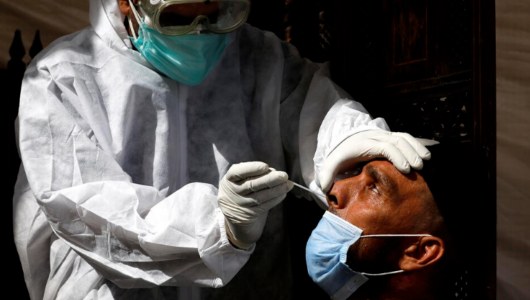ISLAMABAD: The National Command and Operation Centre (NCOC) has resumed mandatory testing for a random 2% of inbound passengers amid concerns over new variants.
This measure aims to identify and prevent the emergence of the JN.1 sub-variant of COVID-19.
However, concerns have arisen regarding the lack of testing kits and Personal Protection Equipment (PPE) at major airports like Islamabad and Karachi, as per officials cited in the report.
The NCOC official informed on Wednesday, stating, “Under the guidance of interim federal Health Minister Dr. Nadeem Jan, heightened surveillance is in effect at the nation’s entry points, including airports, reinstating 2% mandatory COVID-19 testing to identify the JN.1 variant of SARS-CoV-2 or coronavirus.”
Ironically, healthcare workers associated with Border Health Services (BHS) found themselves without access to either COVID-19 testing kits or PPE at multiple entry points. Officials noted that procurement of these items ceased after the World Health Organization (WHO) declared COVID-19 no longer a public health emergency of international concern in June of the same year.
Despite extremely low COVID-19 positivity rates and no identified cases of the JN.1 variant until Wednesday, the National Institute of Health (NIH) issued guidelines for preventing and managing the JN.1 sub-variant.
According to the NIH advisory, referencing the World Health Organization (WHO), the JN.1 sub-variant has been designated as a Variant of Interest (VOI) and is essentially a derivation of the omicron variant’s BA.2.86 sub-variant. It was initially reported in August 2023 by the US-CDC.
The advisory from the National Institutes of Health highlighted the recent global spread of JN.1, noting a significant rise in its prevalence across various WHO regions, particularly in the Americas, the Western Pacific, and the European regions. The Western Pacific, for instance, observed a surge from 1.1% in epidemiological week 44 to 65.6% in epidemiological week 48.
“The purpose of this advisory is to alert and assist health authorities and stakeholders in implementing timely preventive and control measures, preparing for an anticipated surge in outpatient and inpatient department activity in the coming weeks,” stated the NIH.
While acknowledging JN.1’s rapid displacement of other sub-variants and its anticipated high transmissibility, the NIH highlighted current statistics indicating low morbidity and mortality compared to earlier phases of the pandemic.
The advisory emphasized that the clinical symptoms of JN.1 largely resemble those of other sub-variants, depending on an individual’s immunity from vaccination or prior infection. Existing vaccines, tests, and treatments continue to be effective against JN.1, as per the advisory.
Furthermore, based on the WHO’s overall risk assessment, the NIH Islamabad mentioned that despite the rapid rise in JN.1 infections, limited evidence suggests no heightened disease severity compared to other circulating variants. Existing vaccines offer similar protection against this JN.1 sub-variant as against other variants.
In terms of prevention and control, the NIH recommended frequent and thorough hand washing, use of hand sanitizers when handwashing is not possible, adherence to respiratory etiquettes, and staying at home and adopting social distancing if experiencing illness or in close contact with flu-like symptoms.
(Islamabad51_Newsdesk)














